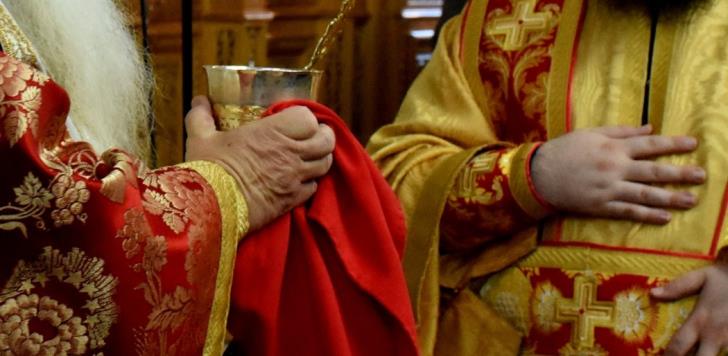"Short psalm alleluia"! The way of receiving Holy Communion is not under negotiation, as clarified by the Church, which insists on the use of the same forceps for all those who will receive, while at the same time, it clarifies that it is not obligatory for anyone who has doubts.
He explained that he does not accept plastic spoons as mentioned in the draft protocol prepared by the Ministry of Health or other substitutes, so he will keep Holy Communion intact, as it has been received through the centuries.
What the Church accepts is the connection of the number of believers who will enter the churches with the square meters of each church (eight square meters for each believer). What changes is the reward that will be given to the faithful since it will now be placed in a bag and the faithful will take it on their own from a point near the exit of each church. When asked about this, the Metropolitan of Paphos, George, stated that this practice has been followed lately for the protection of the faithful, but also for them to feel more comfortable coming to the churches.
Under the current measures, some of which will continue, there will be distance markings between the tracks to prevent any transmission of the virus. The measures are expected to include disinfections inside the churches and the icons.
Yesterday, the director of the Archbishop's office, Michalis Spyrou, stated that Archbishop Chrysostomos "received and studied the protocol sent by the Ministry of Health and that he basically accepted the proposed measures, submitting some remarks that seem to have been accepted."
Regarding the possibility of differentiating the way of receiving the Eucharist, he clarified that this is a matter of faith which is not under discussion or negotiation. He explained that it would be administered with the same silver forceps as always. He also pointed out that the Eucharist is the core of the Divine Liturgy and will continue to be received as it has been through the centuries ".
As for the possible dangers from the attendance of the faithful in the churches, he stated that His Beatitude's wish is for all the necessary measures to be taken so that no believer is offended.
It is noted that from May 4, prayer is allowed in churches, mosques and other places of worship, meaning that no more than 10 people will coexist at the same time. The decree applies to weddings, baptisms and funerals.
As announced, after the issuance of a new decree (its issuance is imminent), ecclesiastical and other forms of religious worship will be allowed in churches, mosques and other religious places, provided that the protocols of hygienic behavior as determined by the Ministry of Health will be strictly observed. The same measures will apply to weddings, baptisms and funerals.
How the reward will be given
On the instructions of the Archbishop to the nuns, they should wash their hands, put antiseptic and then place the antidote in a transparent bag, and after being blessed by the priest (during the Divine Liturgy) it will be placed at the exit from where the receive the outgoing believers.
However, it is worth noting that the faithful still do not feel ready to come to the churches as before, which is why the attendance so far was relatively limited. It is estimated that the number of attendees will gradually increase.
Source: philenews
